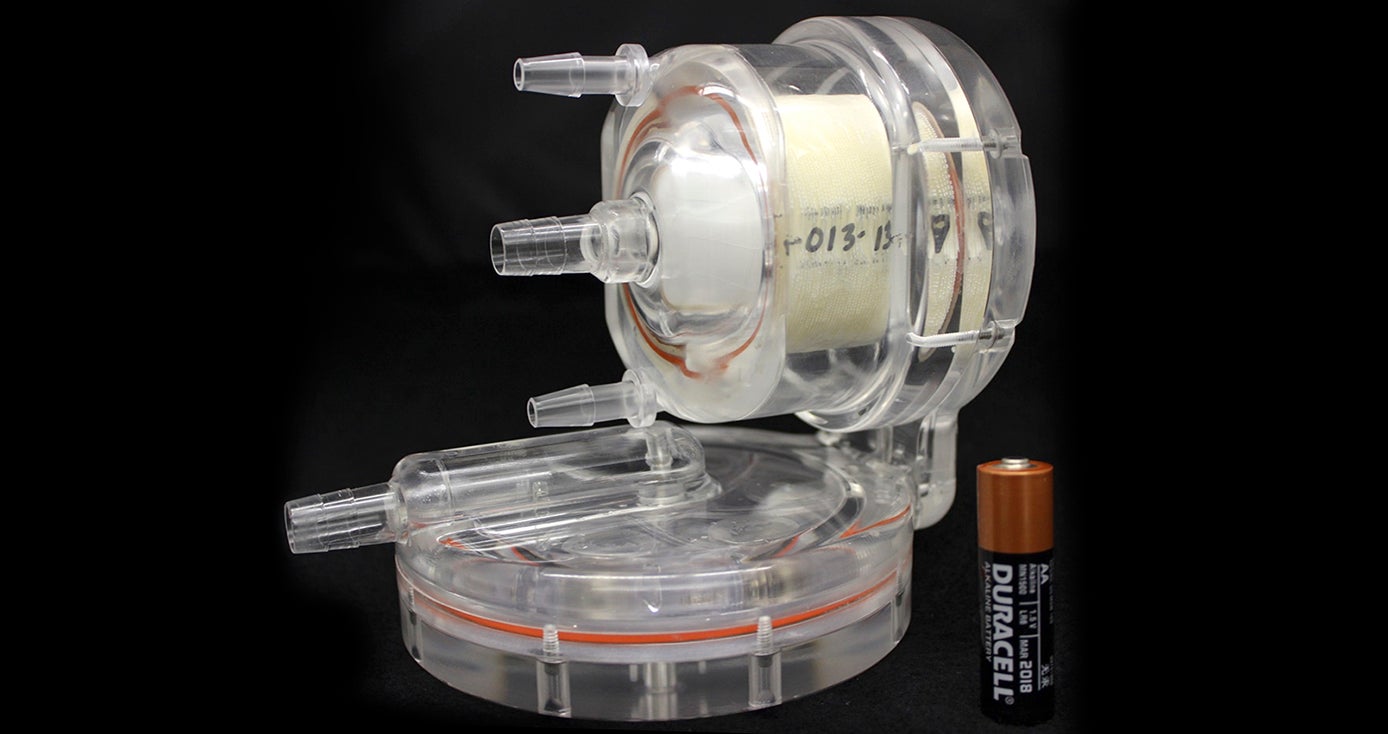
Subscribe to Pittwire Today
Get the most interesting and important stories from the University of Pittsburgh.Wearable Artificial Lung Designed to Help Sick Children Remain Mobile While Hospitalized
Artificial lungs have long been used to help sick children until a lung transplant is available.
While these devices are helpful in supplying oxygen to children suffering from cystic fibrosis, pulmonary hypertension and pulmonary fibrosis, among other diseases, during the wait for lung transplants, they restrict mobility.
“They are labor intensive, there is a lot of equipment involved and they essentially keep these kids bedridden,” said William Federspiel, the William Kepler Whiteford Professor in the University of Pittsburgh Swanson School of Engineering Department of Bioengineering.
Collaboration to Innovation
The Pediatric Device Initiative (PDI) is a McGowan Institute for Regenerative Medicine initiative in collaboration with Children’s Hospital of Pittsburgh of UPMC that aims to transform pediatric health care through the advancement of novel treatments for pediatric tissue and organ failure. The initiative has partnered with sciVelo to assist in accelerating the translation of novel pediatric technologies.
sciVelo is a University of Pittsburgh commercial translation program born out of the Schools of the Health Sciences in 2016.
At Pitt, sciVelo works to support a collaborative and efficient commercial translation ecosystem, leveraging local and national translational resources, to establish Pittsburgh as a gold standard for accelerating early stage research investigators to high impact translational outcomes.
The Pittsburgh Pediatric Ambulatory Lung was among the first cohort of initiative-funded projects. Its conception was a direct result of the initiative's core between the McGowan Institute and Children’s Hospital.
“The relevancy to convey the initiative’s ability to build momentum for pediatric innovation is not only exciting for children's health care, but also the Pittsburgh region,” said Donald Taylor, assistant vice chancellor for commercial translation in the health sciences and sciVelo executive director. “The progress in development and translation of this revolutionary project is a product of the culture of pediatric innovation in the health sciences, established and fostered by the initiative.”
Along with the artificial lung, the initiative also directly funds several other early stage pilot projects aimed toward pediatric patients.
At Pitt, Federspiel has been researching ways to create a more compact respiratory assistance device for children. The work has been fruitful, with the Pittsburgh Pediatric Ambulatory Lung aiming to serve as a bridge to transplantation or recovery in children with acute and chronic lung failure.
This wearable artificial lung, half the size of a coffee can, will be designed for longer-term respiratory support, about one to three months before device change-out. The device will supply between 70 and 90 percent of normal metabolic oxygenation requirements, while pumping blood from one to 2.5 liters per minute.
Perhaps most importantly though, the device will help pediatric patients get out of bed and engage in activity as soon as possible after an operation.
Studies have shown that ambulation during the waiting period for lung transplantation significantly improves post-transplant outcomes.
“Patients won’t be going home with the technology,” said Federspiel. “But it will allow them to move about in a hospital setting.”
An adult version of the lung is also in the works.
Federspiel said the next step for the artificial lung is to find ways to further translate the project toward clinical use.
“The number of pediatric patients is very small, and because the expense of going through the regulatory processes is a burden, it can be difficult to commercialize pediatric technologies like this,” he said.
The researchers are working with the McGowan Institute for Regenerative Medicine and Children’s Hospital of Pittsburgh of UPMC’s Pediatric Device Initiative, in collaboration with sciVelo, to help advance the commercial translation.
“The idea is to be able to bring to patients in lung failure the technologies now available to patients in heart failure, to have technology that gives patients the quality of life where they’re able to be mobile and not be tethered in the intensive care unit,” said William Wagner, director of the McGowan Institute. “We’re trying to make these devices biocompatible, so they don’t form blood clots.”
The project was recently awarded a four-year, $2.9 million grant from the National Institutes of Health.



